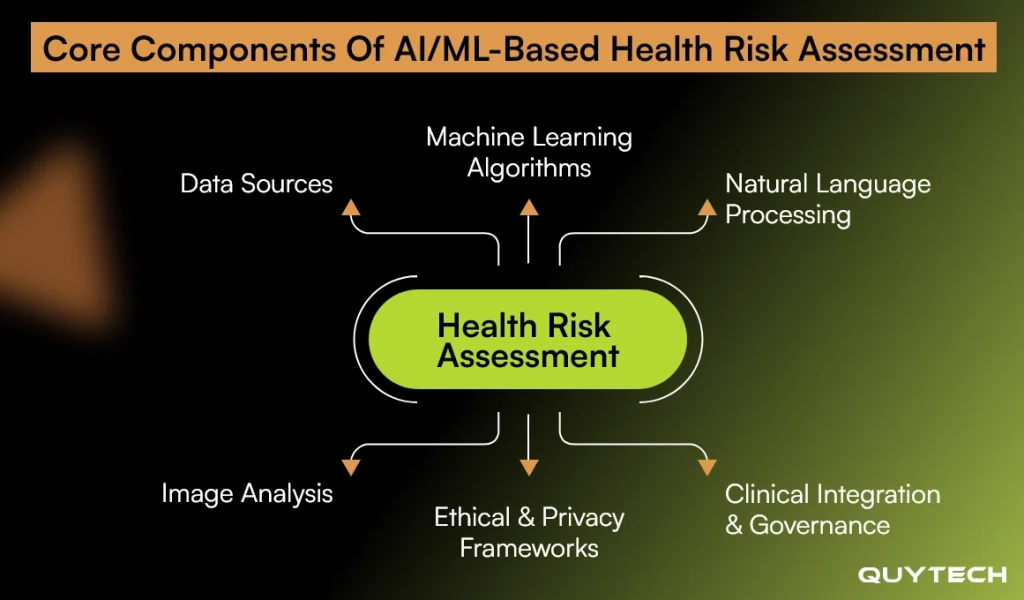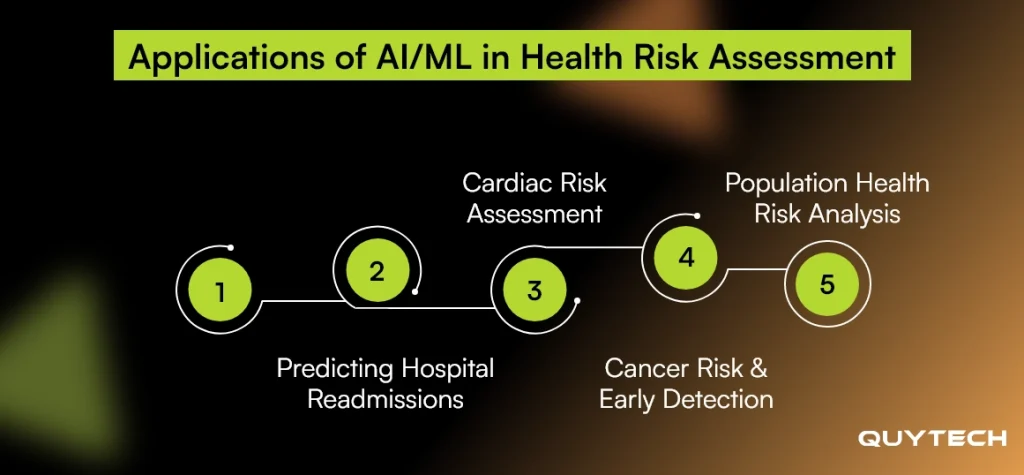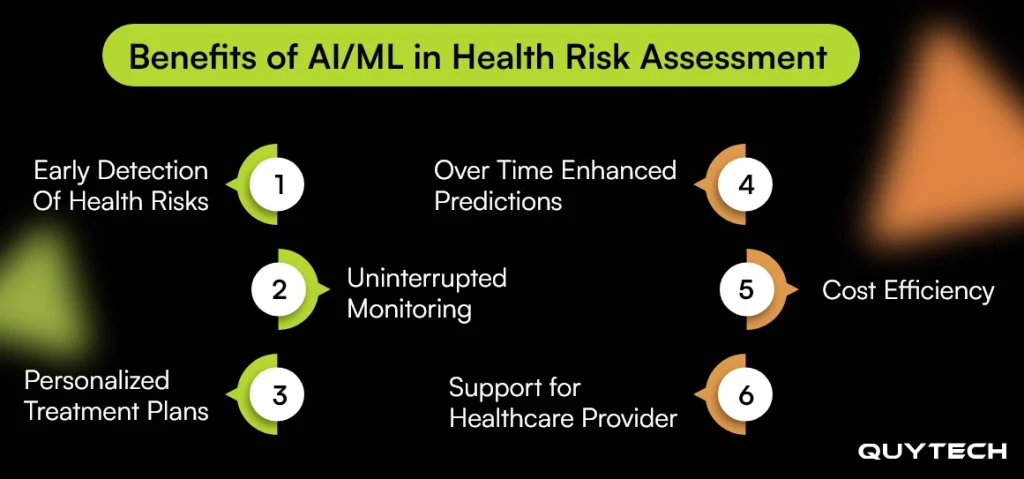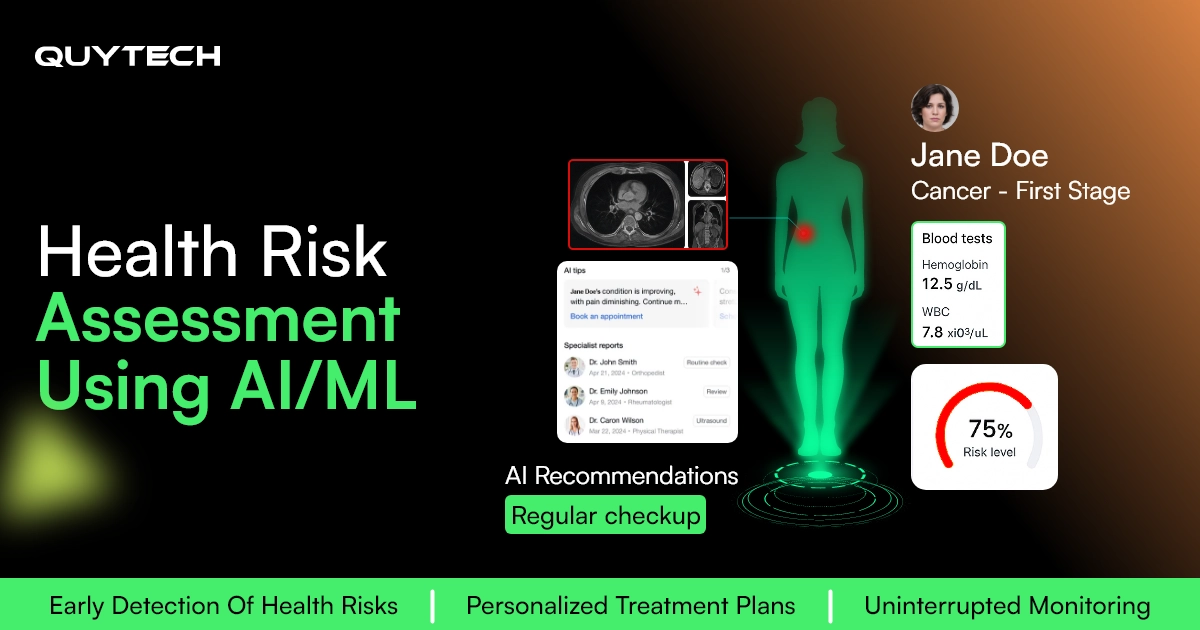In the US, more than 356,000 cardiac arrests happen every year outside of hospitals. And what’s even more alarming is that most of the patients are often healthy people with no prior medical history of heart issues. This uncertainty creates a clot of doubts that traditional healthcare facilities frequently fail to address.
But not anymore! With the combination of artificial intelligence and machine learning, health risk assessment is now a feasible option. Health risk assessment using AI/ML brings in a drastic change. It transforms the manually operated processes of collecting patient data for analysis by introducing AI-powered smart solutions.
In this blog, we will walk you through every detail about health risk assessment using AI/ML. From patient data collection to personalized treatment plan development, we have covered it all.
Key Takeaways:
- The AI in healthcare market is expected to reach USD 187.69 bn by 2030
- Health risk assessment analyzes patients’ data to identify potential health risks and creates personalized treatment plans
- When integrated with AI, it analyzes historical and real-time data.
- Data sources, ML, NLP, image analysis, and privacy frameworks make up its components
- Applications include early detection of chronic disease and cardiac risks.
- AI ensures early detection, uninterrupted monitoring, and personalized treatment plans
AI/ML in Health Risk Assessment: Market Look
- According to a report by The Grand View Research, the global AI in healthcare market is expected to reach USD 187.69 billion by 2030. This growth is expected to increase at a CAGR of 38.62% from 2025 to 2030.
- The report also highlights that the machine learning segment accounted for over 35% of the technology segment’s share in 2024.
- As per the Microsoft IDC Study, 79% of healthcare organizations are actively utilizing AI as of 2024.
What is Health Risk Assessment and How Does it Work?
Health risk assessment refers to the process of analyzing the lifestyle, medical history, and test results of a patient. It helps in identifying potential medical risks.
Unlike normal medical check-ups and tests, where the emphasis is mainly on identifying current health conditions, health risk assessment takes a proactive approach. It focuses on identifying the potential health conditions that can occur in the future.
Health risk assessment primarily begins with collecting patient information (name, age, height, weight, gender, habits, diet, past illness, family history, etc). Once data is collected, assessment and analysis take place. It is done to evaluate overall health. A report is created from the results of this analysis. It highlights patients’ health risks and also provides recommendations to prevent the risks.
How AI and ML Transform Health Risk Assessment
AI and ML bring in a change that completely transforms the traditional methods of health risk assessment. Unlike the traditional systems that relied on periodic check-ups and observations, AI/ML takes a proactive step.
It does not wait for symptoms to show up; they analyze large amounts of data, from historical records to real-time information collected through wearable devices. They predict risks before they turn into serious medical conditions.
Let’s get a better understanding of the role of AI/ML in health risk assessment by taking a look at their working mechanisms:
- Similar to how health risk assessment worked in a traditional system, AI/ML-powered health risk assessment also begins with data collection. However, the data in this scenario is not just basic identity and historical data. It includes the real-time data from health apps, wearable devices, etc.
- Once the data is collected, machine learning plays its role by analyzing patterns and fluctuations in heart rate, blood pressure, and sugar levels. These patterns are capable of revealing potential health risks.
- After analyzing the patterns, predictive analytics defines the likelihood of certain health conditions like diabetes, heart issues, etc. This assists healthcare providers in prioritizing the high-risk areas and preventing the low-risk ones.
- AI/ML goes beyond generic prescriptions. They offer personalized recommendations and treatment plans as per the medical reports of the patient.
- Unlike traditional healthcare systems that require follow-up appointments, an AI-powered health risk assessment collects real-time data and continually improves its diagnostic accuracy.
Similar Read: Integrating AI & Machine Learning into Business Operations
Core Components Of AI/ML-Based Health Risk Assessment
An AI/ML-based health risk assessment system is what its components make it. These components help AI in healthcare to perform the functions that make it stand out from conventional systems. Here’s a list of the core components of AI/ML in health risk assessment:

Data Sources
The most important component of AI/ML-based health risk assessment is the data sources. Without the data, the system would not have any information for analysis and risk assessment. Along with the availability of data sources, their integration is also important as it will allow the analysis of not just the structured data but also the unstructured data.
Machine Learning Algorithms
Machine learning algorithms work on enhancing the quality of assessments. They do so by continuously learning from past data and its patterns and then using that knowledge and understanding to improve the accuracy of the predictions.
Natural Language Processing
The role of natural language processing in health risk assessment is to analyze unstructured data. It assists in the analysis of free texts like doctors’ prescriptions, discharge documents, etc. This makes the process of data analysis more efficient, as not just structured but also unstructured data is included.
Image Analysis
As mentioned above, human-written texts like prescriptions are also analyzed. To play that role, image analysis makes it to the core component list of AI in health risk assessment. It analyzes images and extracts written texts from them. It structures the data acquired and extracts meaning for risk assessment.
Ethical and Privacy Frameworks
Wherever artificial intelligence is utilized, ethical and privacy frameworks come hand in hand. Since health risk assessment makes use of patient data, data privacy frameworks become a necessity. Ethical frameworks ensure that AI models do not contain any bias that could blind their ability to analyze accurately.
Clinical Integration and Governance
Clinical integration ensures that the AI/ML-based solution can integrate with existing systems. Governance ensures that the use of AI in health risk assessment complies with all the legal requirements and medical standards.
You Might Also Like: How AI Is Transforming the Healthcare Industry: Top 10 Ways
Applications of AI/ML in Health Risk Assessment
Now that you are aware of the core components that make up an AI/ML-based health risk assessment system, let’s walk you through the applications of the same:

Early Detection of Chronic Diseases
AI and ML, when blended together, help in identifying patterns in patients’ health reports. With these patterns, they can detect chronic diseases before they surface. This helps in adopting proactive prevention plans.
Predicting Hospital Readmissions
With real-time and historical data of the patient, hospitals can predict the need for readmissions. This will help in providing optimal care to the patients and also contribute to improving their condition.
Cardiac Risk Assessment
With the help of image analysis, natural language processing, and machine learning, AI can analyze structured and unstructured reports. With this analysis, it can easily predict heart issues and potential cardiac arrest risks.
Cancer Risk and Early Detection
AI in health risk assessment helps in detecting cancer risks at an early stage. It is capable of analyzing X-rays, mammograms, reports, etc. With this, it can identify the type of cancer and also suggest treatment for the same.
Population Health Risk Analysis
AI/ML-based health risk assessment can analyze large data sets. With this, they figure out common patterns of health risks for certain age groups or genders. This helps in spreading awareness and also enhances preparedness.
Benefits of AI/ML in Health Risk Assessment
Adopting AI/ML in health risk management brings in a lot of benefits for not just the healthcare institutions but also for the patients. Here are some of the key benefits of AI/ML in health risk assessment:

Early Detection Of Health Risks
AI in health risk assessment goes beyond basic assumptions. It analyzes not only the historical data of the patient but also real-time data collected through fitness applications and wearable devices. With the help of this data, AI and ML detect health risks at a very early stage without waiting for symptoms to show up.
Personalized Treatment Plans
What makes AI/ML-based health risk assessment stand out from traditional systems is that it does not follow generic treatment plans. Instead, it creates personalized treatment plans that consider everything from basic health factors to patient habits, lifestyle, and additional needs. Such treatment plans result in better risk prevention and improved health conditions.
Uninterrupted Monitoring
Unlike traditional risk assessments that require fixed follow-ups, AI/ML-based health risk assessment monitors patients 24/7. This uninterrupted monitoring is possible with the help of IoT wearable devices and health applications that feed real-time patient data. This data, when analyzed, gives insights into the patients’ condition.
Over Time Enhanced Predictions
AI in health risk assessment utilizes machine learning algorithms that continually improve over time. They are not rigid and rule-based. They enhance their accuracy over time with every action they take. They understand how patients perform activities and adapt to their habits. This helps in eliminating the chances of misdiagnosis.
Cost Efficiency
AI in health risk assessment contributes to saving costs that patients and healthcare systems spend on extensive treatments. It detects health risks at an early stage, eliminating the need for elaborate tests and treatment costs.
Support for Healthcare Provider
Unlike traditional healthcare services that take weeks of data collection and analysis, AI/ML-based health risk assessment does it within minutes. This helps healthcare providers speed up the diagnosis processes by automating the monotonous tasks.
Similar Read: Role of AI in Legal Firms: Enhancing Efficiency and Accuracy
Real-World Examples of AI/ML in Health Risk Assessment
Now that we have covered most of AI/ML in health risk assessment, let’s deepen our understanding with the help of some real-world examples of the same:
Mayo Clinic (USA)
Mayo Clinic in the US makes use of AI and machine learning models to collect data on patients. They analyze ECG data and patterns to predict potential cardiac arrest risks.
Narayana Health (India)
Narayana Health analyzes real-time data collected through IoT wearable devices with the help of AI. This assists the healthcare providers in tracking the real-time health conditions of patients.
Johns Hopkins Hospital
Johns Hopkins implemented AI-powered health risk assessment systems for Sepsis patients. It helped them in predicting the health risks hours before they actually occur. This allows healthcare providers to implement preventive measures and enhance preparedness.
Cleveland Clinic
The Cleveland Clinic utilizes artificial intelligence to analyze patients with high chances of heart and stroke risks. AI in health risk assessment helps healthcare professionals use data to better understand patients and create personalized treatment plans.
Ethical Considerations of AI in Health Risk Assessment
Every coin has two sides, and similarly, implementing AI/ML in health risk assessment has its own pros and cons as well. However, these can be addressed by carefully complying with the following ethical considerations:
Data Privacy
Since AI in health risk assessment operates on patient data, data privacy becomes a huge challenge as well as a consideration.
Healthcare providers should ensure that the patient data stays in safe hands. Practices like activity logging, data encryption, and authorized access should be implemented.
Bias Elimination
The AI models are often trained with historical data. This data can be outdated, and training AI with this data can result in biased outcomes.
To overcome this, healthcare providers should utilize unbiased and diverse data sets. This will ensure that the AI provides precision and is fair with its outcomes.
Transparency
AI tools should offer transparency. Instead of acting like an opaque object providing outputs, they should be capable of explaining how and why they offered the results.
This will help healthcare providers understand the actual cause. Transparency eliminates thought clashes and offers clarity.
Informed Consent
As AI/ML-based health risk assessment systems utilize the data of the patients, they should be made aware of it. Patients should be made aware of how and why artificial intelligence tools are utilizing their data.
This should be initiated by healthcare institutions. Along with awareness, patients should also consent to the use of their data by AI. This will help in building trust among patients.
Similar Read: How Predictive Analytics is Transforming the Healthcare Industry
Final Thoughts
The healthcare section is undergoing a truly futuristic transformation. The process that was once reactive and lacked effective preparedness has now taken a proactive approach. The treatment plans that were made after symptoms showed are now created ahead of time.
That’s how AI/ML has brought in an anticipated change. They bring about benefits like early health risk detection, personalized treatment, uninterrupted monitoring, accurate predictions, and cost efficiency. All of these reflect that upgrading to AI/ML-based health risk assessment is not about being tech-savvy, but about proactively protecting lives.
FAQs
Yes, AI/ML-based health risk assessment is more accurate as it does not consider just historical data of the patients; it analyzes real-time data as well.
Yes, when built with consideration of patient data privacy. Along with this, data security compliance also ensures that patient data is safe when using AI/ML.
No, AI does not replace doctors in health risk assessment. Instead, it assists them by carrying out data analysis tasks and providing actionable recommendations for treatment plans.
Yes, AI in health risk assessment can analyze ECG data and monitor vitals in real-time. It identifies potential risks like cardiac arrest before the symptoms surface.



